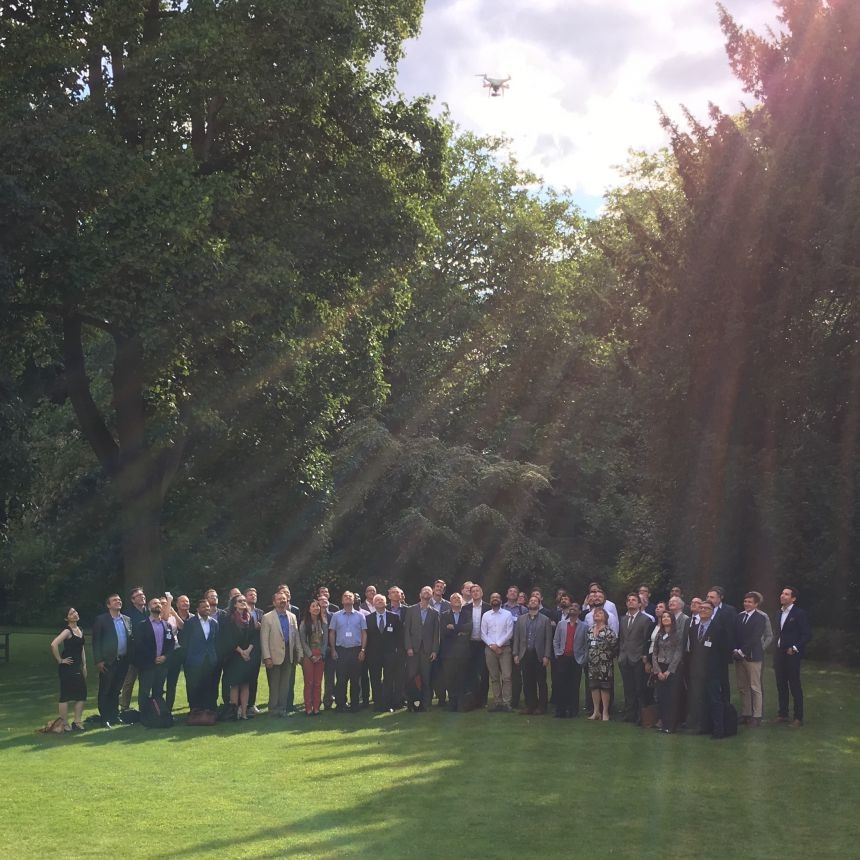Jul 9 2018
The use of drones has enhanced the efficiency of data gathering, enabling teams to monitor and survey vast areas without affecting the everyday life, landscape, or their own safety. However, many are concerned about the long-term safety and security, and ethics of such technologies.
 The team from the Centre for Technology and Global Affairs test a drone. (Image credit: Diego)
The team from the Centre for Technology and Global Affairs test a drone. (Image credit: Diego)
Oxford University’s Centre for Technology and Global Affairs recently collaborated with drone companies to look for possible governance models for ways to best regulate the civil airspace and generally the skies in future.
The Centre is a futuristic interdisciplinary research outlet with its focus on gaining insights into the impact of technology on existing business and governance. It held its first “Robotics Skies Workshop: The Role of Private Industry and Public Policy in Shaping the Drones Industry” on June 21 and 22, 2018.
The workshop was a congregation of policymakers, practitioners, and experts from government, industry, and academia to evaluate the regulatory and governance challenges in relation to the ever-increasing worldwide Unmanned and Autonomous Aerial Vehicles (UAVs and AAVs) industry.
Recent technological advances have outpaced policy discussions. In view of such a development, the Centre’s researchers are undertaking interdisciplinary research at the intersection of technology, industry, and government policy.”
Lucas Kello, Director of The Centre for Technology and Global Affairs
The program included discussions related to the most recent advancement in the sector, for instance, technological developments in geo-fencing, the use of drones-as-a-service, industry-led initiatives in raising safety awareness of drones users, Unmanned Traffic Management (UTM), and also the interplay between digitalization, data, and automation in enabling future commercialization of UAV and AAV technologies.
High-level speakers at the workshop were Matthew Baldwin, Deputy Director-General of Mobility and Transport from the European Commission; Pavel Abdur-Rahman, Data Scientist and Partner at IBM; Jessie Mooberry, Head of Deployment with Altiscope from Airbus; Christian Struwe, Head of Public Policy Europe at DJI, among others.
I am pleased to see that the first workshop on the future of autonomous drones perfectly fulfils the Oxford Centre’s long-term vision to serve as a powerful policy-building hub for the beneficial development of breakthrough technologies.”
Artur Kluz, Founder
Attendee Ludovic Drouin, Science and Technology Officer from the French Embassy in London commented on the value of the workshops, describing it as “a tremendous opportunity to witness the state of the art in UAVs, the workshop is foremost in shaping a potential regulatory framework and in understanding inherent challenges associated with the future of the industry.”
The Centre acts as a bridge between scientists and the realms of technology and policymaking, the aim of which is to enable policy resolution around critical and emergent problems over six technological dimensions: Cyber Issues, Outer Space, Artificial Intelligence, Blockchain, Robotics, and Nuclear Issues. Artur Kluz is Founding Donor of the Centre for Technology and Global Affairs and the Centre was supported by core funding from Kluz Ventures.
Robotic Skies is the first in a sequence of planned workshops at the Centre, the goal of which is to create a sustainable forum for inter-sectoral dialogue and driving extensive exchange of knowledge across disciplines and industries.